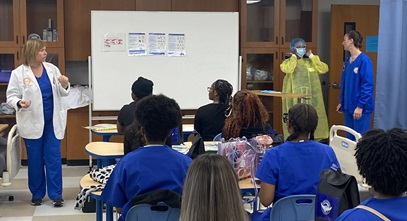The number of nurse practitioners has nearly doubled over the past four years to more than 200,000. According to the American Association of Nurse Practitioners, there are currently 205,000 licensed nurse practitioners, compared with 106,000 in 2004 — and that number is expected to keep on rising.
The U.S. Bureau of Labor Statistics (BLS) predicts the number of nurse practitioners will increase by 34% from 2012 to 2022. This is more than three times the national average of 11% growth expected for all occupations during this time period.
Rise in Demand for Nurse Practitioners
According to the BLS, there are many different reasons behind the growing need for nurse practitioners, including:
- An increase in demand for healthcare services due to a heightened emphasis on preventive care.
- A larger number of newly insured individuals now receiving coverage under the Affordable Care Act.
- The aging baby boomer population.
Increasing Role of Nurse Practitioners
As states continue to change their laws governing the authority of nurse practitioners, they’re often permitted to play a larger role on the healthcare team. These professionals are also increasingly gaining public recognition as a trusted source for primary healthcare needs.
In fact, Forbes reports that many national drugstore chains have opened onsite clinics during the past few years staffed by nurse practitioners. Walgreens opened around 40 clinics in 2014 alone — employing a total of more than 1,200 nurse practitioners at more than 420 clinics. Additionally, CVS has 2,700 nurse practitioners on staff at its 960 clinics.
Doctors Urging Students to Become Nurse Practitioners
Science 2.0 recently reported the results of a study finding that 66% of doctors would encourage students to become nurse practitioners, instead of following in their footsteps. The survey was mailed to 957 nurse practitioners and 957 physicians.
A total of 467 responses were received from the former and 505 from the latter, revealing that many doctors believe the soaring costs of medical school and increasing limitations on how patients can be treated could outweigh the benefits of becoming a general practitioner. Additionally, an overwhelming 88% of nurse practitioners surveyed would recommend their career to students.
Breaking Into the Field
A nurse practitioner is required to have a minimum of a master’s degree from an accredited program. They must also be a licensed registered nurse in their state and pass a national certification exam. Additionally, these professionals may be required to pass a number of other certification exams, based on the type of patients they treat and the specialty area in which they practice.
Interested in becoming a nurse practitioner? South University offers a variety of flexible master’s degree programs that can prepare you for a career as a Nurse Practitioner and for pursuing your goal of helping others.
Sources
- http://www.forbes.com/sites/brucejapsen/2015/01/25/at-205000-strong-the-nurse-practitioner-will-see-you-now/
- http://www.bls.gov/ooh/healthcare/nurse-anesthetists-nurse-midwives-and-nurse-practitioners.htm#tab-6
- http://scrubsmag.com/66-percent-of-doctors-recommend-careers-as-nurse-practitioners-instead-did-you-read-it/




